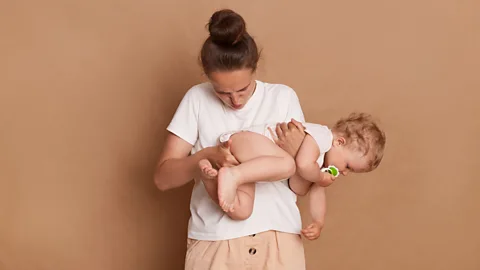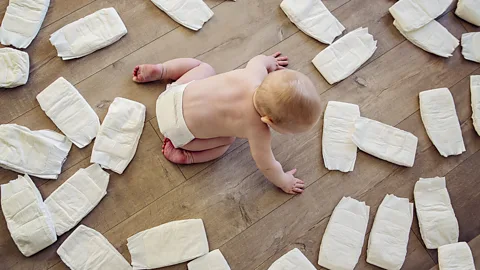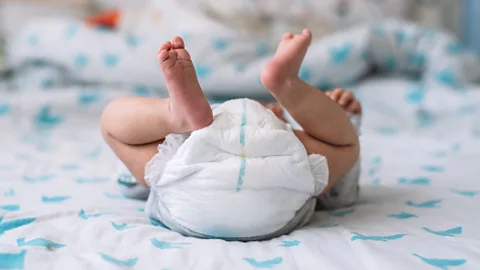Research is unveiling the surprising, lifelong impact of what enters a baby's gut in the days after birth.
It's 2017 and two technicians at Queen's Hospital pathology laboratory in London wait anxiously for the day's mail.
On a good day, this lab might receive 50 individual tightly-wrapped packages, each containing a treasure within – a tiny sample of baby poo, carefully scraped from the nappies of newborn infants by their loving parents.
These technicians are the front line soldiers of the Baby Biome study, which aims to understand how a baby's gut microbiome – the trillions of microbes living in their digestive tract – affect their future health. Between 2016 and 2017, the lab analysed the poo of 3,500 newborns.
It was a lot of poo. But the results were very revealing.
"It's not until about three or four days after birth that you start to get a really good signature of microbes in the gut, so it takes a couple of days to start colonising," says Nigel Field, professor of infectious disease epidemiology at University College London (UCL), who leads the Baby Biome project.
"You're essentially sterile when you're born. So it's a pretty extraordinary moment for the immune system, because until that moment, all the body surfaces don't come into contact with microbes."
Every single one of us, once we've passed those initial few days of life, develops a gut microbiome. Scientists now believe this community of bacteria, fungi and viruses play a vital role in our health. As adults they help break down hard to digest fibre and provide the enzymes necessary to synthesise certain vitamins. Simply by being there, they protect us from harmful pathogens, while some even release natural antibiotics to kill off invaders.
And the benefits of having a healthy gut microbiome stretch beyond even this. Emerging research suggests that a well-functioning gut microbiome could protect against conditions like anxiety, depression and even neurodegenerative diseases such as Alzheimer's.
The flip side of this coin, though, is that having an "unhealthy" gut microbiome as an adult is linked to a long list of conditions including cardiovascular disease, colorectal cancer, chronic kidney disease, diabetes, inflammatory bowel disease and obesity.
Yet while scientists have conducted lots of studies into the role that gut bacteria have on adult health, until recently they knew little about their impact during childhood. That has started to change, however.
 Getty Images
Getty Images"The first microbes that colonise a baby's gut are like the architects of the immune system," says Archita Mishra, senior lecturer at the University of Sydney in Australia, who studies the role of the microbiome in early-life immune development. "They help 'train' the body to distinguish friend from foe, teaching immune cells how to tolerate food antigens [and] harmless microbes, and mount defences against pathogens."
According to Mishra, the bacterial communities that establish in the first six to 12 months are responsible for allergy risk, how well the child responds to vaccines, and how well the gut barrier – the layer that separates the gut's contents from the rest of the body – functions.
"The first thousand days of life appear to be a window when the gut microbiome leaves an imprint that lasts decades," says Mishra.
Face full of poo
The placenta is widely believed to be a bug-free zone, meaning babies don't have a gut microbiome when they are inside the womb. Instead, babies seem to inherit most of their bacteria from their mother's digestive tract – not their vagina, as previously thought.
"Nature has a very refined method of establishing the gut microbiome in a newborn infant," says Steven Leach, a senior lecturer specialising in the gastrointestinal microbiome at the University of New South Wales, Sydney. "If you think about the birth process, the infant is born head down facing the mother's spine. So looking at anatomy, the baby head is pushing out the contents of the [mother's] intestine. So basically, when the baby's born, they get a face full of poo."
It appears that gut bacteria start affecting your health almost from the very moment you are born. For example, Field's research on baby poo has shown that having the right gut bacteria in the early days of life could help protect babies against viral infections later in childhood. The team analysed poos from 600 babies at day four, seven and 21 of life. Some of these babies were followed up again at six months and a year.
"The biggest difference really is the mode of birth," says Field. "So caesarean babies look quite different to vaginally born babies."
This makes sense, as babies born by caesarean section miss out on the "face full of poo" enjoyed by vaginally born infants. Caesarean sections – or C-sections – are of course, a lifesaving and often medically necessary procedure. But the research shows that babies born this way miss out on beneficial bacteria that could protect them from respiratory infection.
The 2019 study found that in the first week after birth one of three main pioneer species usually set up shop in the baby's gut – Bifidobacterium longum (B. longum), Bifidobacterium breve (B. breve) or Enterococcus faecalis (E .faecalis).
"According to which one you get, it sets a trajectory for the other species that then colonise the baby," says Field.
 Getty Images
Getty ImagesBy day seven, vaginally-born babies tended to have either B.longum or B.brevae in their digestive tracts, while babies born via C-section were more likely to be colonised by E. faecalis. The gut microbiome of vaginally born babies tended to match that of their mothers, confirming that bacteria are passed mostly from the mother's gut, not her vagina. Meanwhile, babies born via C-section had more bacteria associated with hospital environments.
"E. faecalis is a bacteria that's associated with opportunistic infection. So if your immune system is not working very well, it can cause disease," says Field.
The researchers found the differences in gut bacteria between vaginally-born and caesarean-delivered babies largely evened out by the time the infant turned one. However, there were signs that having good bacteria from day one gave babies a health advantage. The team tracked over 1,000 of the babies to see if any were admitted to hospital.
"We were able to see that babies whose guts were dominated by B. longum were about half as likely to be admitted for a respiratory tract infection within the first two years of life, when compared to the B. brevae babies and the E. faecalis babies," says Field.
In other words, having B. longum seemed to protect some vaginally-born infants from respiratory conditions. It's possible that the absence of beneficial gut bacteria like B.longum could explain why babies born via C-section have a slightly elevated risk of developing certain inflammatory conditions such as asthma, allergies, autoimmune disorders and obesity, although more work is needed to confirm this.
It's not known why a baby's gut bacteria may protect them from infection, but one leading theory is that Bifidobacterium such as B. longum, or other beneficial bacteria called Lactobacillus, are experts at breaking down complex sugars found in human milk called oligosaccharides. These sugars are a major component of human breast milk, but are indigestible by the infant's own enzymes. B. longum converts the sugars into molecules called short chain fatty acids (SCFAs), which are believed to regulate the immune system – potentially helping the infant fight off infections better.
SCFAs can also help teach the infant's immune system to ignore and tolerate innocuous, harmless stimuli. In other words, they help guide the immune system towards a more tolerogenic immune response.
"In Western societies we're not really exposed to deadly bacteria anymore," says Leach. "So the health problems that we're seeing [in the wider Western population] are more to do with having an overactive immune response."
Bifidobacterium are also thought to help create a gut environment that is more hostile to pathogenic, disease-causing bacteria. Unlike an adult's gut, the intestines of newborn babies are aerobic, meaning they contain oxygen. This is to support the gut as it starts to absorb nutrients for the first time. At birth, the intestines are also neither acidic nor alkali (they have a neutral pH).
 Getty Images
Getty Images"The problem is that the types of bacteria that could potentially harm a newborn infant like these neutral pH aerobic conditions," says Leach. "Bifidobacterium help by rapidly using up the oxygen and creating an anaerobic environment which drops the pH. This limits the growth of potentially harmful bacteria."
However, scientists are only just at the beginning of understanding how all this fits together. "It may be more nuanced than 'caesarean section is less good and vaginal delivery is better'," says Field. "Not all vaginal-born babies got the bugs which were associated with reduced risk, and not all caesarean section babies got the health outcomes that we were worried about."
Microbe engineering
Nevertheless, the finding raises the question – should we intervene to give babies (and especially babies born via C-section) a helpful microbial boost? "C-sections save lives and so our job is to rebuild the missing microbiome, safely and precisely," argues Mishra.
The question is how. One option sometimes considered is "vaginal seeding", whereby a swab of vaginal fluid is smeared on a newborn's skin and mouth in the hope that beneficial microbes will take root in the baby's gut.
The practice is growing in popularity, yet experts warn it could transfer dangerous infectious pathogens: over a quarter of women are thought to carry group-B strep in their vagina, for example, which could be fatal to an infant. What's more, the 2019 baby biome study showed that the beneficial microbes weren't coming from the mum's vagina anyway.
More like this:
• How gut bacteria are controlling your brain
• Snug with your bugs? How microbes control your sleep
• The promise of banking umbilical cord blood
There are other potential microbiome engineering options too, such as faecal microbial transplants, also called a stool or poo transplant. Here, stool from the mother could be transferred to the infant's gastrointestinal tract. There have been some promising small scale trials, but the practice is not currently recommended.
"At the moment, we don't know whether a mum's vaginal or even faecal microbiome is the right one to give to a baby, and I think there's a risk that it might not do good, and that it could do harm that we don't yet understand," says Field.
Probiotic supplements have been shown to be a safe and effective way to influence gut flora, however. Some clinical trials suggest that they could protect extremely premature or low birthweight infants from necrotising enterocolitis, a life-threatening intestinal disease that primarily affects premature babies, while other studies indicate they could reduce the risk of preterm birth. However, there is still the question of knowing which bacteria to provide.
"Any changes in establishing a microbiome in an infant should focus on restoring or rectifying the impact that human intervention has had on this process," says Leach. "Vaginal seeding and faecal microbial transplants are essentially just dirty probiotics. You just don't know what's in them, and they carry risk. So probiotics are probably the way to go."
Mishra also says oral probiotics may be the most practical and safest approach, although notes that results vary widely as each baby's gut is unique.
The future, she adds, likely lies in precision microbiome interventions, guided by a baby's genetic, dietary and immune profile. "Think of it as 'personalised microbial medicine'," she says.

কোন মন্তব্য নেই:
একটি মন্তব্য পোস্ট করুন